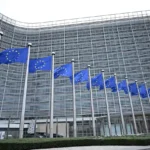As Le Monde notes, even a hypothetical mention of a potential role for the German army in security guarantees for Ukraine instantly split a country steeped in a pacifist political culture.
“War themes” return to the center of politics
Even if sending troops remains a purely theoretical scenario, a single caveat was enough to inflame Berlin’s internal debate. On Monday, answering a question about what contribution Germany might make after the Washington summit, Chancellor Friedrich Merz allowed for the participation of the Bundeswehr in ensuring Ukraine’s security in the event of a peace agreement with Moscow. He stressed his readiness “to discuss this with [his] coalition in Berlin, including the possibility of decisions that require a mandate—that is, decisions the Bundestag would have to take. But it’s too early today to give a definitive answer.”
That sentence pulled the pin. On Tuesday, August 19, the far-right Alternative for Germany (AfD) rushed to tap into protest sentiment. On X, the party posted a placard showing the chancellor rubbing his hands in front of five sullen-faced young men, with the caption:
“Merz wants to send you to Ukraine? We don’t!” The text added: “Merz does not want to rule out sending German soldiers to Ukraine. That would not be peacekeeping but a lasting escalation toward Russia. We say clearly: we will not send you to Ukraine!”
Legal framework and political practice
As Le Monde reminds readers, the Bundeswehr is under parliamentary control. Any overseas mission requires a Bundestag decision—usually on the basis of a UN, NATO, or EU mandate, in line with the case law of the Constitutional Court in Karlsruhe. Formally, a simple majority suffices, but political custom nudges governments to secure at least some opposition backing.
Foreign Minister Johann Wadephul (CDU) has already proposed bringing Alliance 90/The Greens into the talks. The Greens immediately demanded a special joint meeting of the defense and foreign affairs committees.
The ruling coalition is divided
Even inside the coalition that has governed Berlin for three months—tying together the CDU/CSU and the SPD—the issue has exposed rifts. Former SPD Chancellor Olaf Scholz consistently ruled out sending German troops to Ukraine, and during the recent campaign for the February 23 election the Social Democrats painted Friedrich Merz as a “dangerous warmonger,” while he promised to step up military support for Kyiv, including long-range weapons.
SPD parliamentary leader Matthias Miersch set a key precondition: American participation. If Western countries are to provide security guarantees for Ukraine, “then it is critical that the United States be present,” he said on Tuesday during a visit to Lower Saxony. President Donald Trump, however, has ruled out sending ground forces, pushing that responsibility onto Europeans; for his part, he is prepared to consider air support as an element of security guarantees for Ukraine in the event of a peace agreement with Russia.
A government member from the SPD camp summed up Berlin’s logic this way: “The German tradition is to avoid ‘decoupling’ Europe and the United States in military affairs. That doesn’t necessarily mean American troops on the ground, but you need a component that ties us together. It’s a Cold War legacy. The idea is to prevent Putin from edging the United States out of Europe’s security debate.”
The pacifist left’s optics: “historical reasons”
The “don’t drag the Bundeswehr in” line is shared on the left. The leader of BSW (Sahra Wagenknecht Alliance) demanded the soldier question be closed off outright:
“Friedrich Merz must definitively exclude sending Bundeswehr soldiers as part of Western security guarantees for Ukraine—if only for historical reasons. In the event of conflict, Germany immediately becomes a party to the war, and a chancellor cannot allow that. Nor should anyone expect Moscow to accept NATO troops in Ukraine as part of a negotiated solution,” Sahra Wagenknecht wrote on X on Monday.
NATO, UN, OSCE: what “mandate” and what mission?
Former SPD parliamentary leader Rolf Mützenich argued for an international “frame” before any national steps: “I would prefer that we persuade the United Nations—or at least the Organization for Security and Co-operation in Europe, which has significant expertise—to participate in this process before we consider individual participation by nation-states.” He emphasized the need to define any mission’s tasks in advance: “You cannot convince Parliament if it doesn’t understand what the final mission will be,” Mützenich told public radio Deutschlandfunk.
Doubts on the right as well: “the Bundeswehr lacks resources”
As Le Monde notes, skepticism is also audible among Christian Democrats. According to German media, CDU/CSU parliamentary leader Jens Spahn urged his caucus to refrain from public comments on the topic. Meanwhile, Saxony’s minister-president Michael Kretschmer (CDU) again distanced himself from ramping up military aid to Kyiv and spoke out against sending troops:
“The presence of German soldiers in Ukraine must not be considered. The Bundeswehr does not have the resources,” he told the weekly Der Spiegel.
Resources are indeed the soft underbelly. On Deutschlandfunk, the Bundestag’s armed forces commissioner Henning Otte (CDU) warned: “There is one thing you must not do: keep taking on more missions without strengthening the personnel base.” The Bundeswehr intends to increase its ranks from 180,000 to 203,000 service members. In the autumn, a bill to gradually reintroduce conscription is set to be tabled.
Bottom line: a hypothesis that split the country
There is no talk of a cease-fire, let alone a peace agreement, and President Vladimir Putin shows no readiness for a deal. Yet a single hypothesis—even one pushed “to the after” of a cease-fire—was enough to resurrect Germany’s old anxieties and reflexes: parliamentary control of the army, reliance on an international mandate, historical wariness toward “missions abroad,” and the obligatory linkage with the United States. As Le Monde sums it up, Germany remains a country where any “use-of-force” topic instantly becomes an identity marker—and the trigger for a ferocious argument.
This article was prepared based on materials published by Le Monde. The author does not claim authorship of the original text but presents their interpretation of the content for informational purposes.
The original article can be found at the following link: Le Monde.
All rights to the original text belong to Le Monde.


















